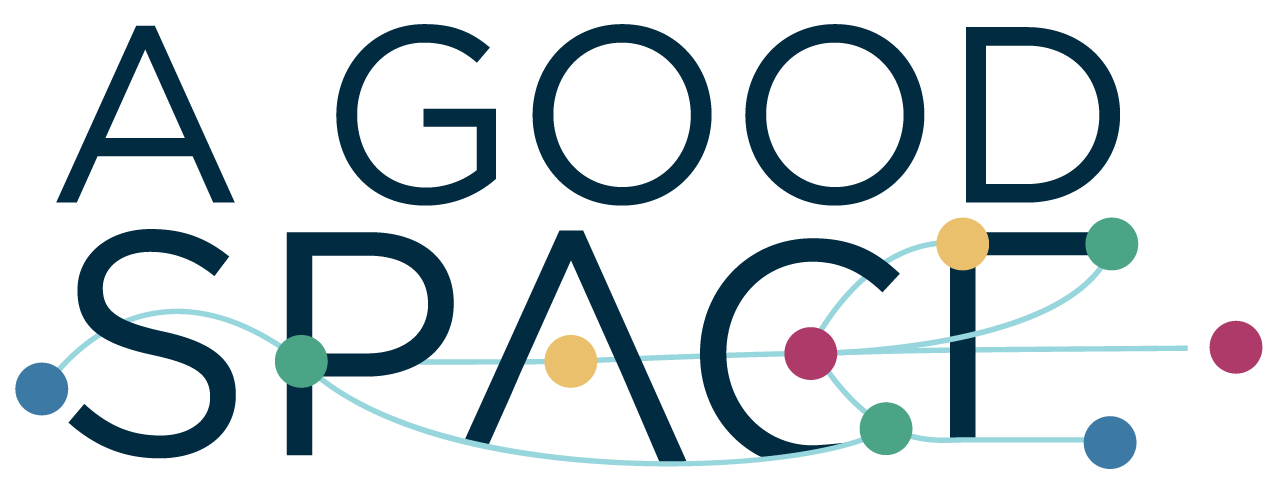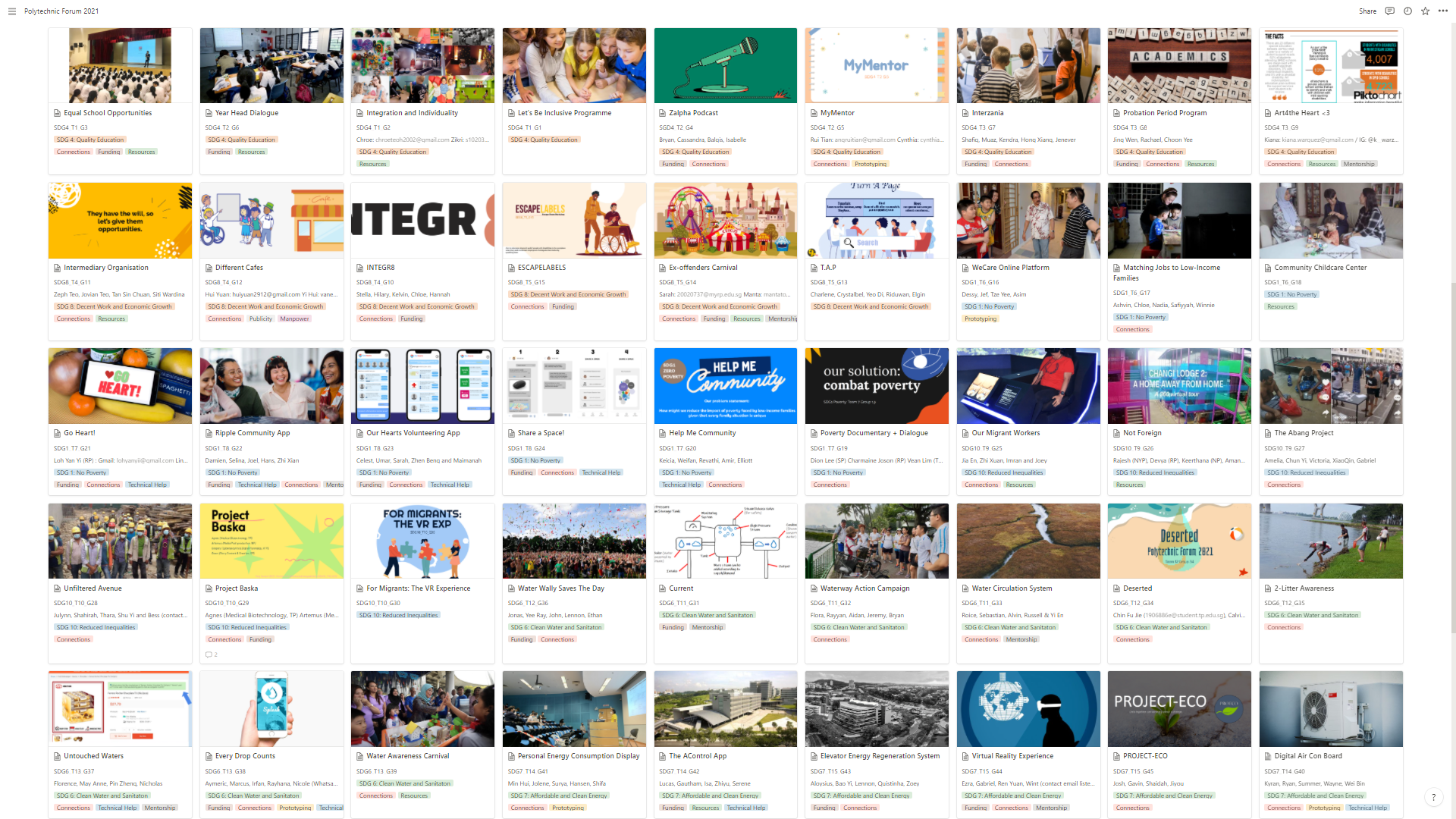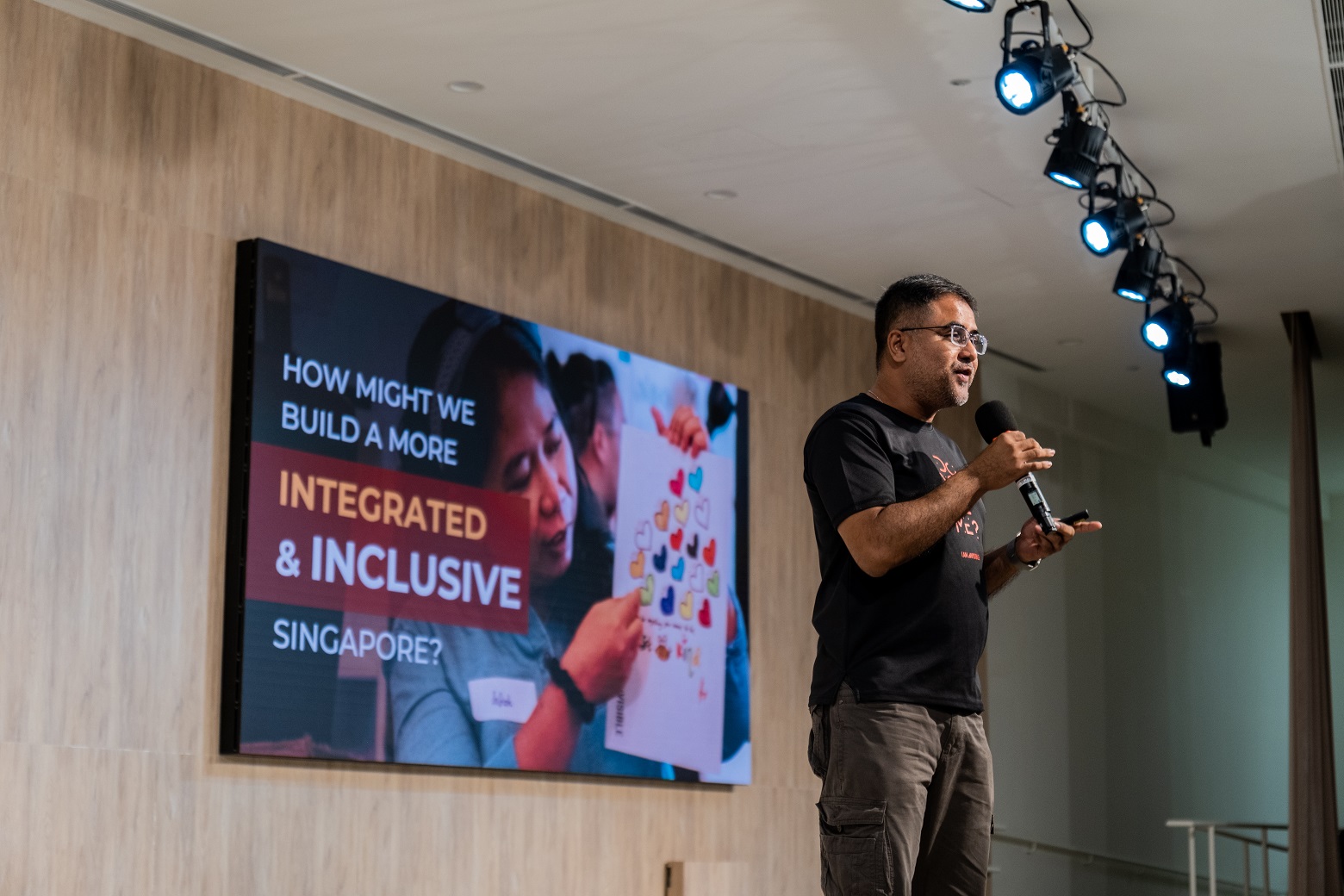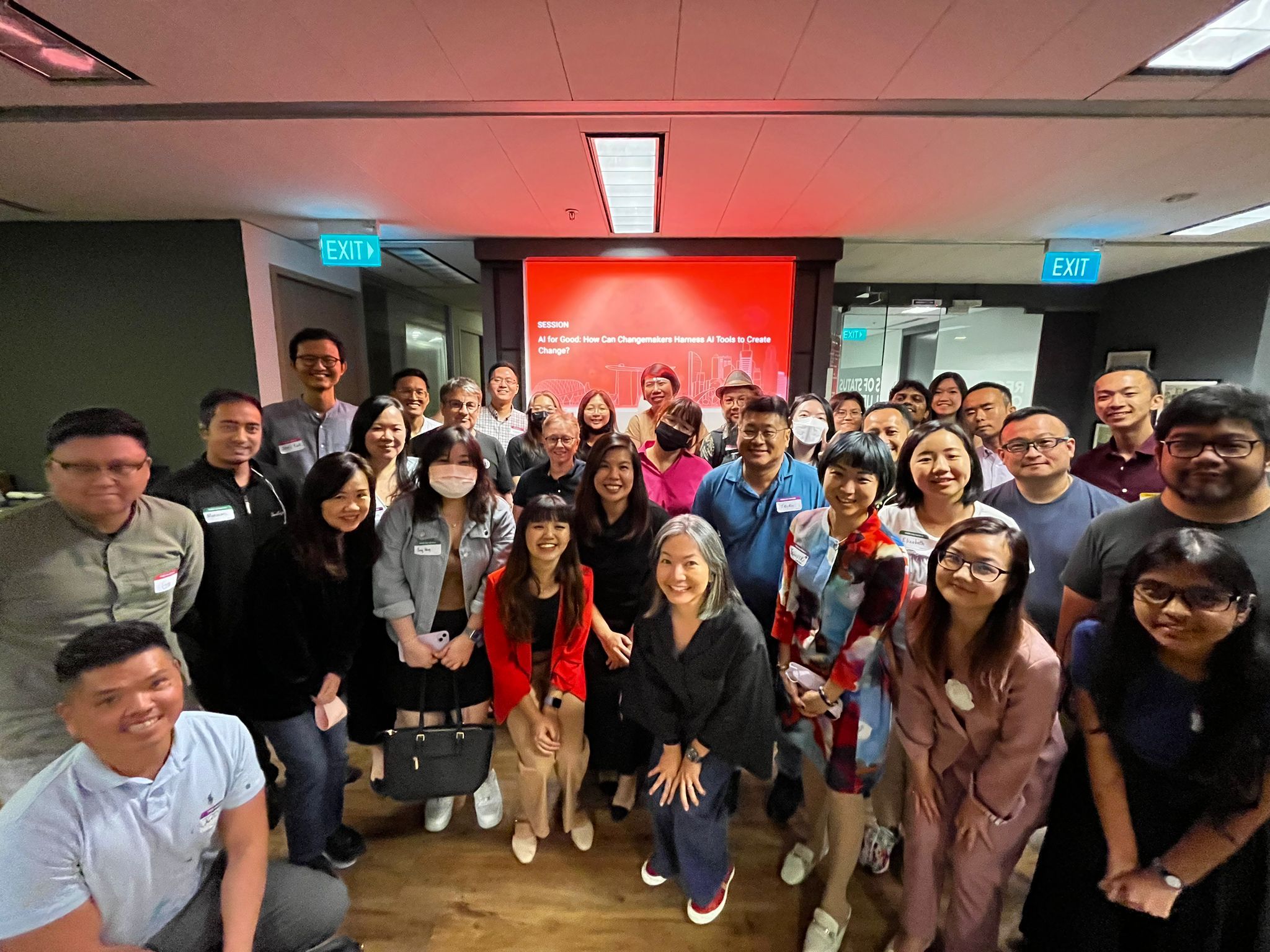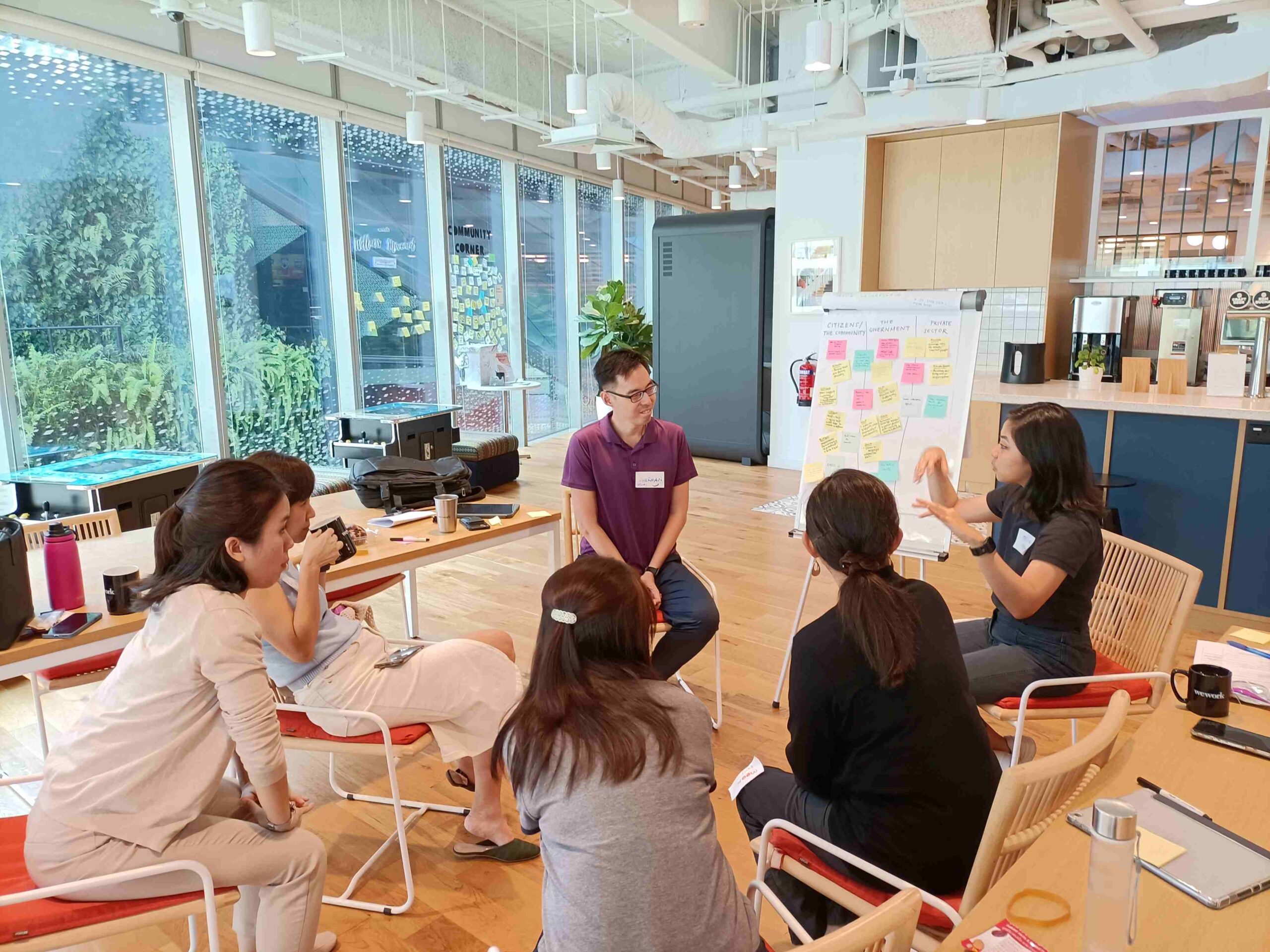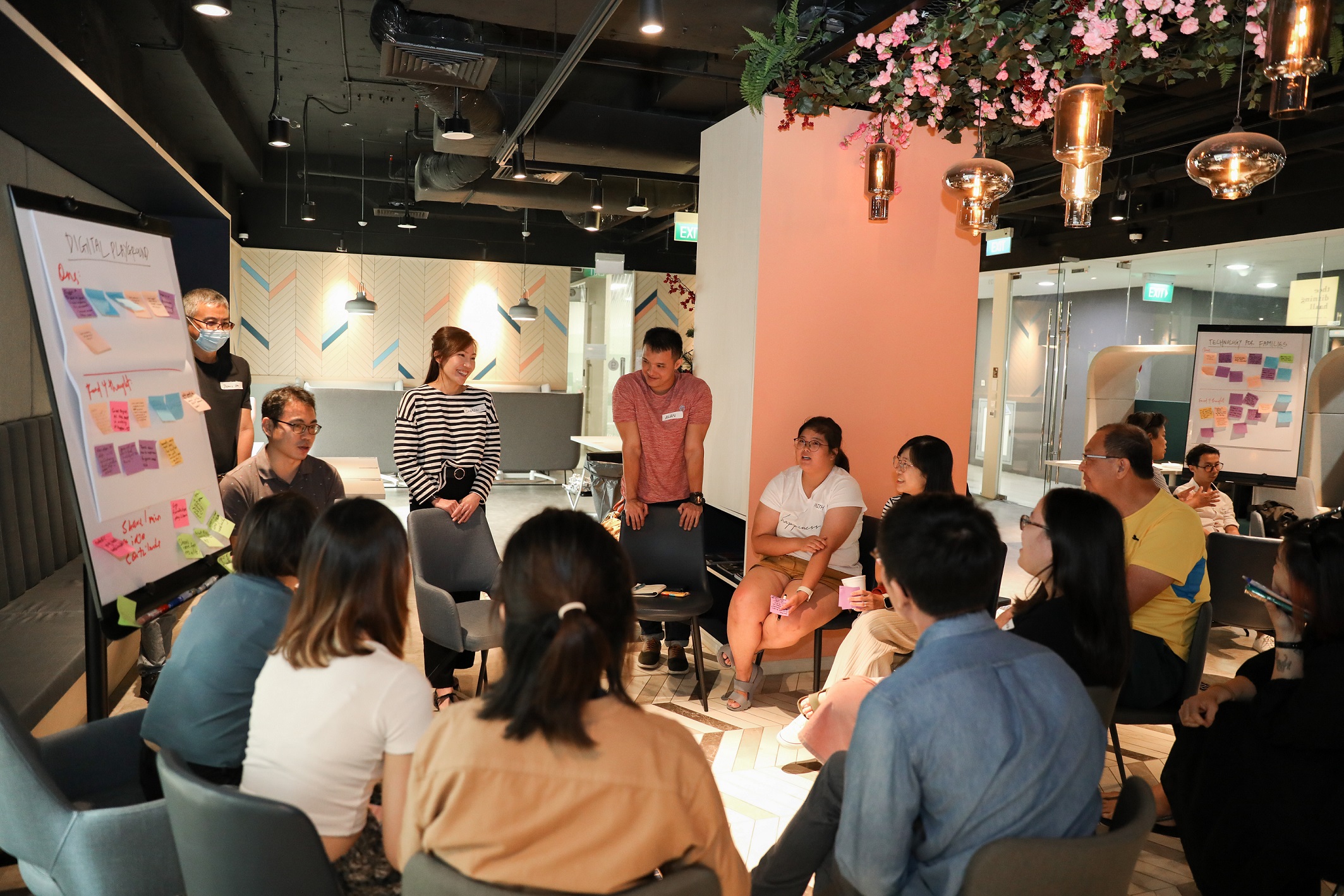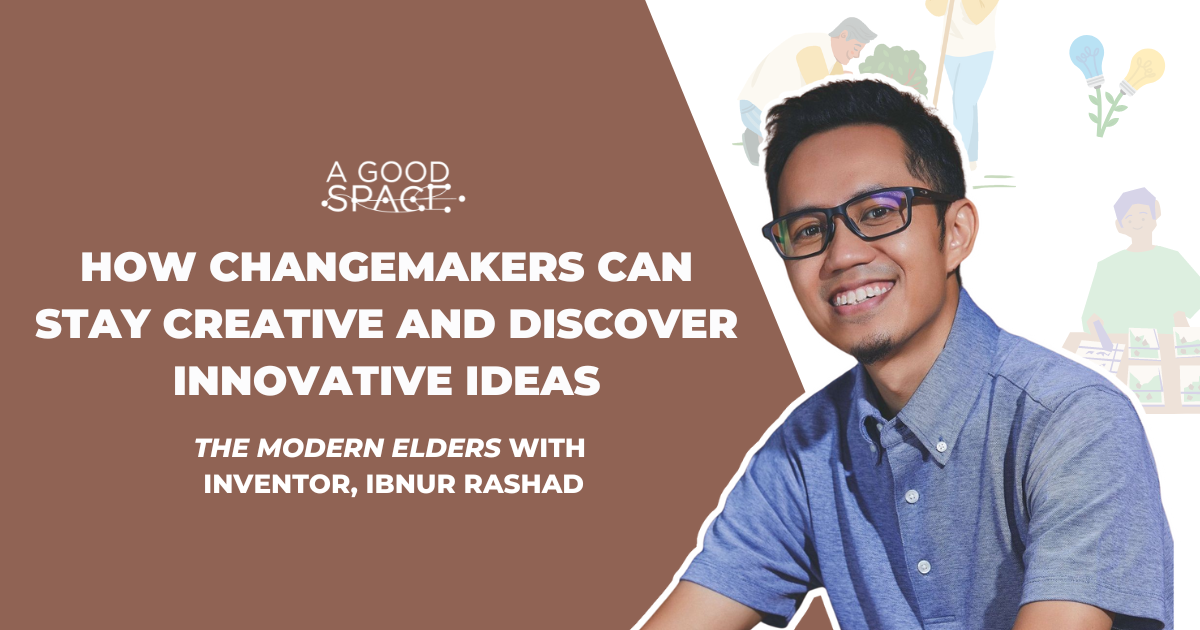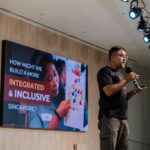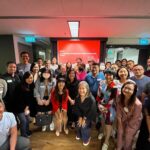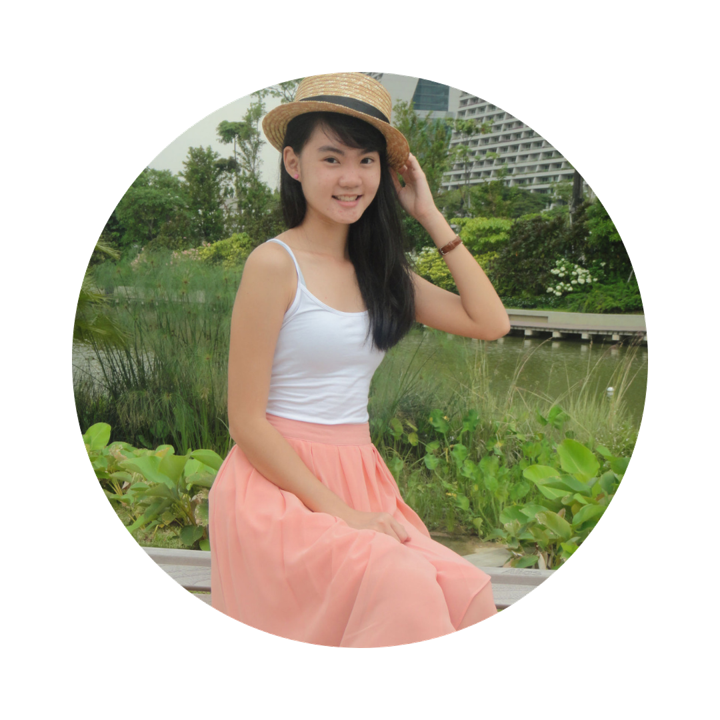Margaret Mead once said: “Never doubt that a small group of thoughtful, committed citizens can change the world; indeed it’s the only thing that ever has.”
In September 2021, 10 of our changemaker members worked with the amazing folks from Ngee Ann Polytechnic’s Student Development Office and Office of Service Learning on this year’s Polytechnic Forum.
We co-designed a 4-day virtual experience, exposing 300 students across 5 polytechnics to various social issues and communities in Singapore, inspiring them to become changemakers. In this article, I hope to share our story and the lessons we learnt in nurturing these youths.
A short history of Poly Forum
The Polytechnic Forum started in 1996 to help students across the 5 polytechnics understand national issues through discussions, group work and dialogues with industry and government leaders.
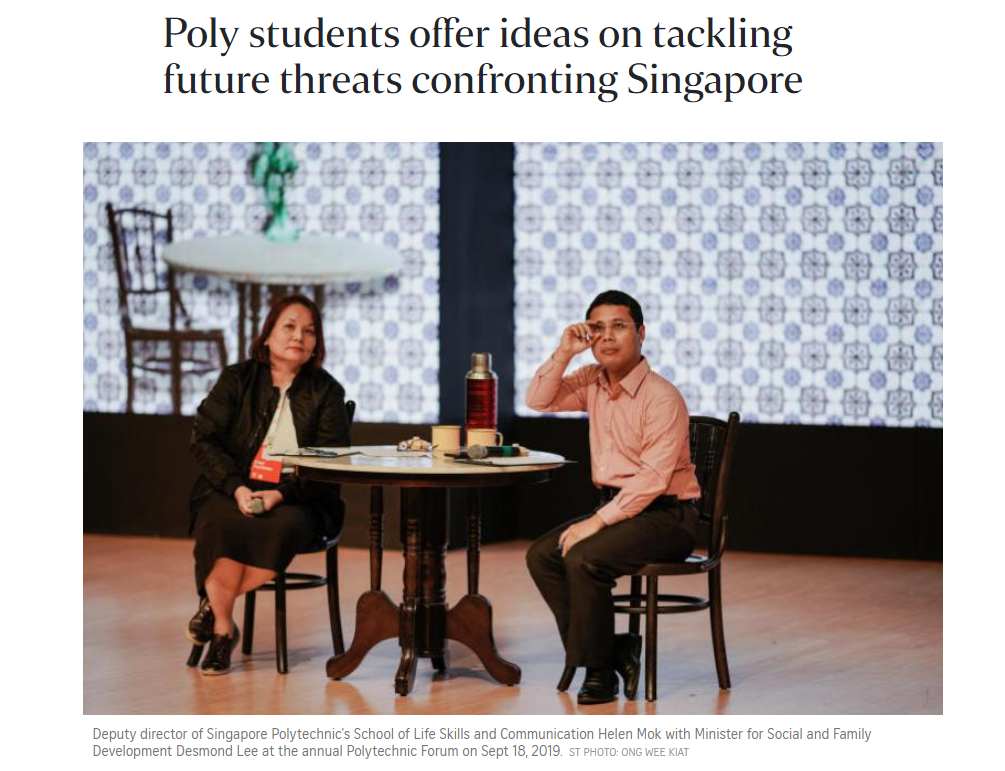
Usually happening in September each year, 60 selected students from each Polytechnic gather for a residential forum either overseas or locally. They engage in learning journeys, fireside chats and present their ideas based on a given theme to a distinguished panel or Ministers on the last day of the forum.
This year’s forum was hosted by Ngee Ann Polytechnic, with the theme being “A Green, Sustainable & Resilient Singapore” through the lenses of 8 United Nations Sustainable Development Goals (SDGs). Students learnt about these 8 SDGs in the Singaporean context and generated ideas for projects they can start to contribute to these SDGs.
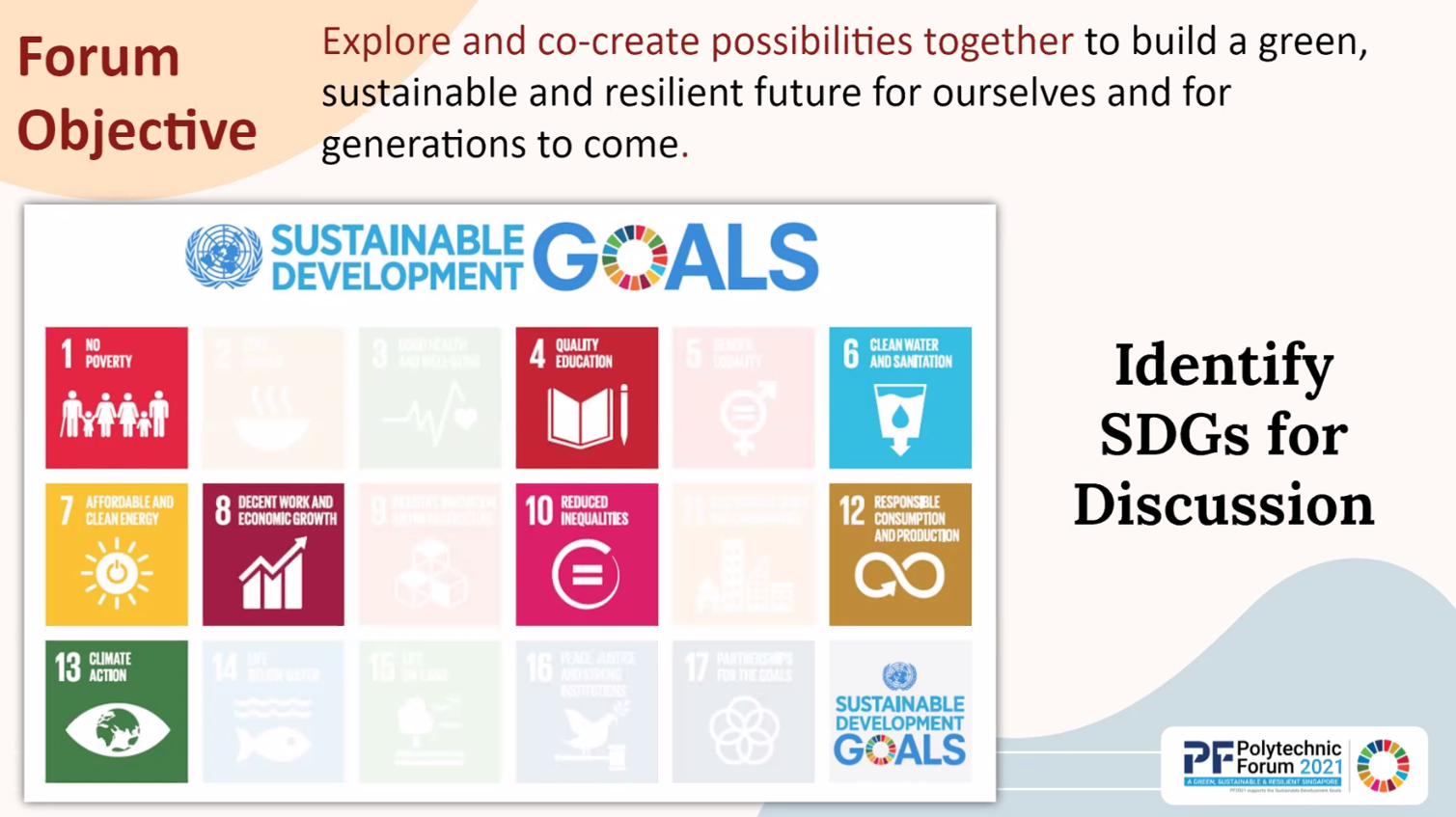
Each of the 300 students taking part in the forum was assigned to an SDG, and further assigned to groups of 5 for their projects. In light of COVID-19, this year’s forum was fully virtual, which presented many challenges and opportunities for growth to the organizing team.
Taking a different approach
In studying previous editions of the forum, the team from Ngee Ann and us decided to do 3 things differently for this year.
Firstly, we wanted students to interact with community members to hear their stories first-hand and receive feedback on their ideas. For example, if they were learning about SDG 1: No Poverty, we wanted them to meet with someone living in a rental flat.
Secondly, we wanted to intentionally follow up with interested students after the forum, so that their ideas and energy are not lost after the 4-day forum ends and they have to go back to school life.
Thirdly, with Service Learning being a signature pedagogy for Ngee Ann Polytechnic, we decided to infuse it into Day 2 of the forum, so students got a chance to learn about community members and issues by performing a service with them.
Day 1: Community Dialogues
Day 1 began with an introduction to the theme for this year’s forum. Following that, students each got a chance to hear from 4 speakers about key issues in the SDGs they were assigned to. Students in SDG 4 (Quality Education) heard from youths who had taken unconventional paths in their education journey and the educators supporting them.
Students in SDG 8 (Decent Work and Economic Growth) heard from an ex-offender and employees of Foreword Coffee, a social enterprise which hires differently-abled persons, to learn about their strengths and challenges in seeking employment.
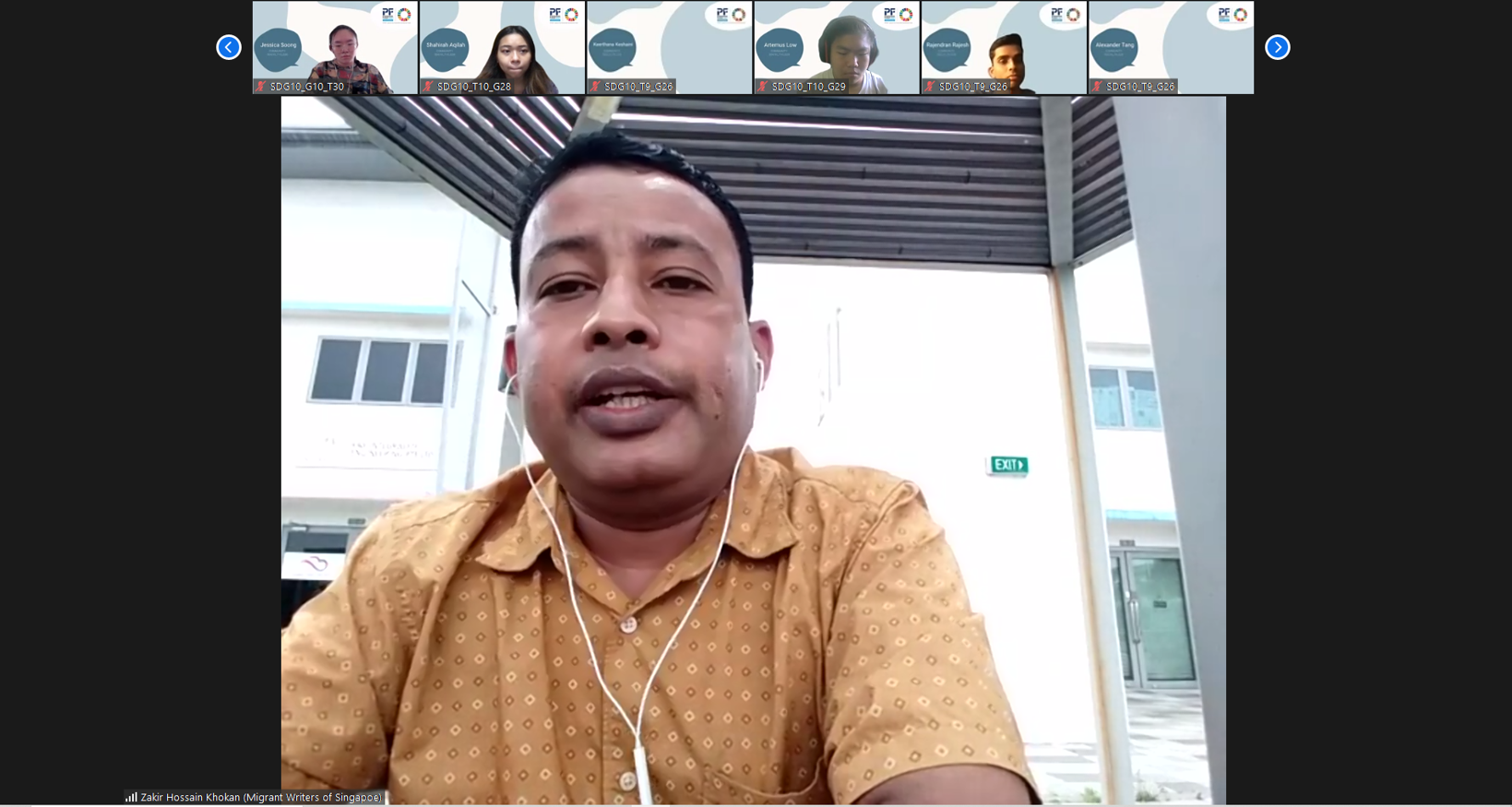
Students in SDG 1 (No Poverty) heard from social workers about challenges faced by low-income families amidst COVID-19 and the digital divide, which is fast becoming the next frontier of inequality.
Students in SDG 10 (Reduced Inequalities) heard from a domestic worker, a migrant worker and two changemakers supporting them, learning about their living conditions and mental well-being challenges amidst the pandemic.
Students in SDG 6 (Clean Water and Sanitation) learnt about Singapore’s water strategy and innovative solutions being deployed by local social entrepreneurs to help rural communities in South-East Asia access water.
Students in SDG 7 (Affordable and Clean Energy) learnt about Singapore’s energy strategy and challenges faced by overseas communities in securing energy.
Finally, students in SDG 12 (Responsible Consumption and Production) learnt how businesses in Singapore were upcycling plastics and soap and how social entrepreneurs were reducing food waste and growing their own food to boost Singapore’s food security.
Students in SDG 13 (Climate Action) learnt how climate change was affecting both humans and animals in Singapore as well as how companies and architects are incorporating sustainable practices into their buildings.
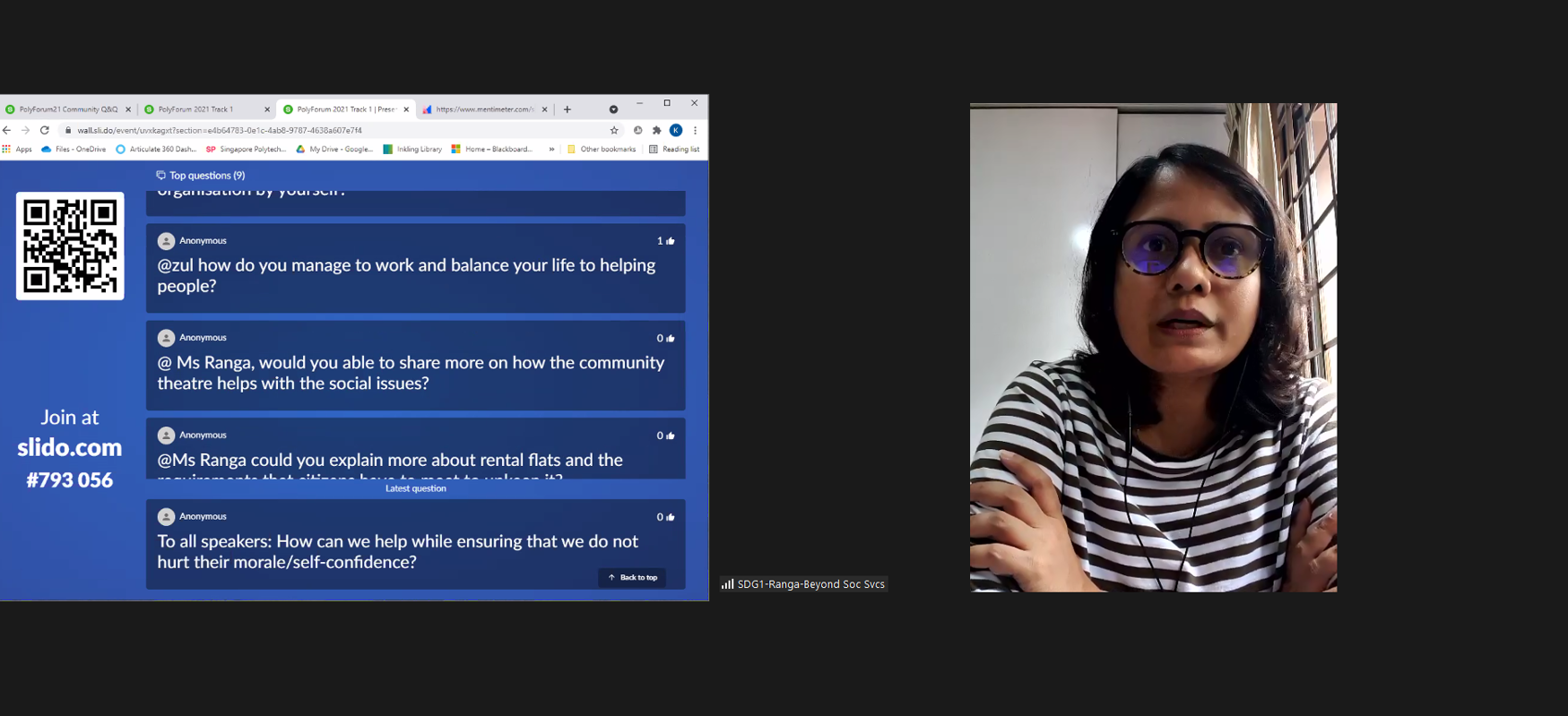
After listening to the speakers, students had a chance to ask questions and a lively round of Q&A followed. We were pleasantly surprised at the depth of questions asked by the students across the different SDGs and their outpouring of curiosity.
Day 2: Service Learning
On Day 2, students deepened their understanding of the issues and communities through performing a service. Together with the good folks from Ngee Ann Polytechnic’s Office of Service Learning, we designed 8 service learning activities, one for each SDG.
For SDG 4, students were split into groups and interacted with students and teachers from mainstream and independent schools to observe how inequalities could play out in the education system. They then created a graphic to positively affirm the strengths of the student or teacher they interacted with.
For SDG 8, students created social media graphics to advocate for inclusive employment of ex-offenders and differently-abled persons at the workplace, and received immediate feedback from representatives of various non-profit organizations working with these groups.
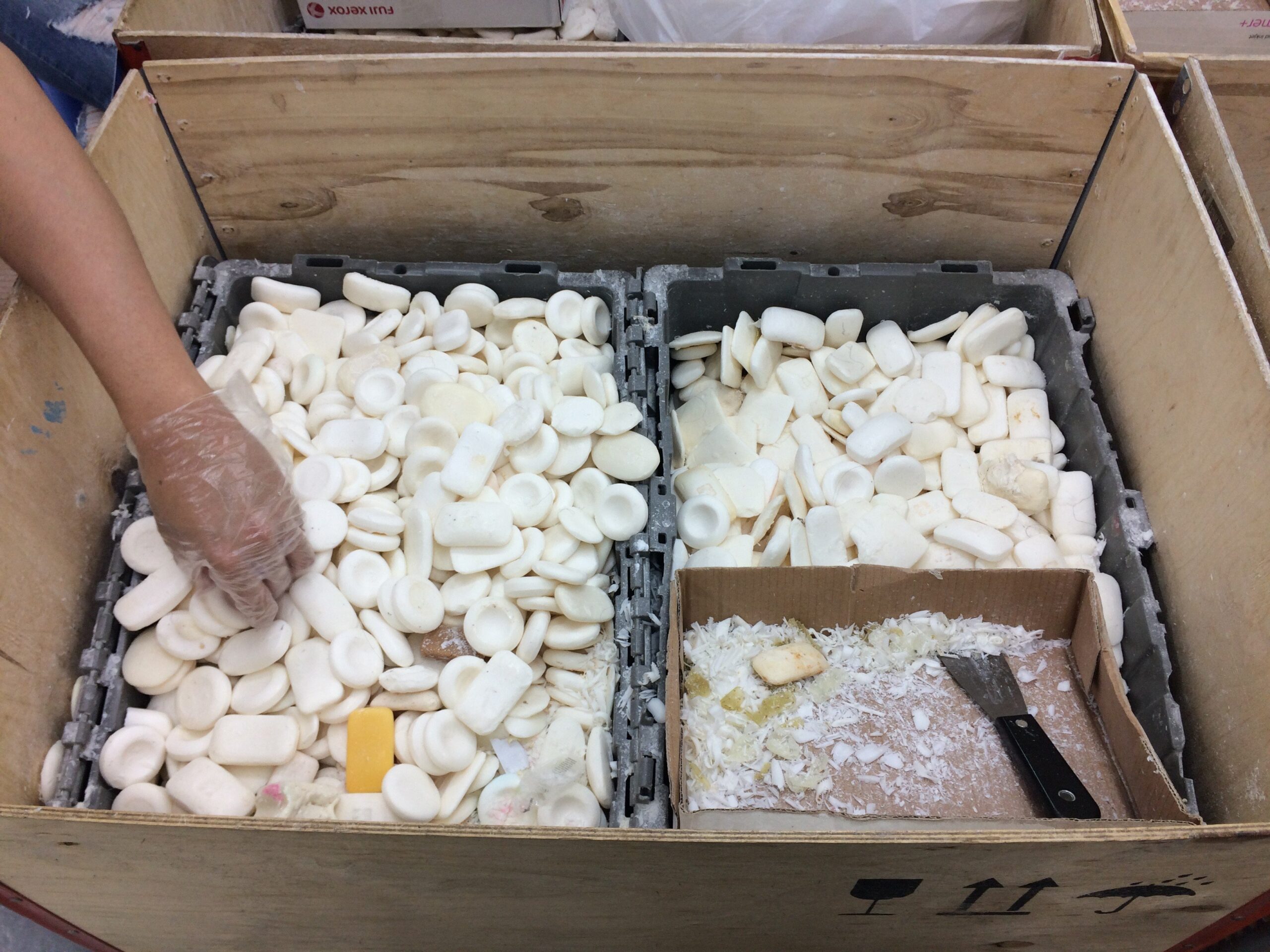
For SDG 1, students were assigned a profile belonging to a low-income community member and tasked to create a list of items they would buy if they had $50 to spend for a week. Shortly after, they met with the actual member who gave feedback on their list of items. In doing so, the students learnt about how basic needs might vary from person to person and also discovered the strengths of persons from low-income communities in budgeting and stretching their dollar.
For SDG 10, students upcycled bars of unused soap from hotels, scraping away the impurities in the soap and eventually donating the soap to migrant workers working in their estate. In doing so, they learnt about hygiene challenges faced by migrant workers in their dormitories and some of the systemic issues they face.
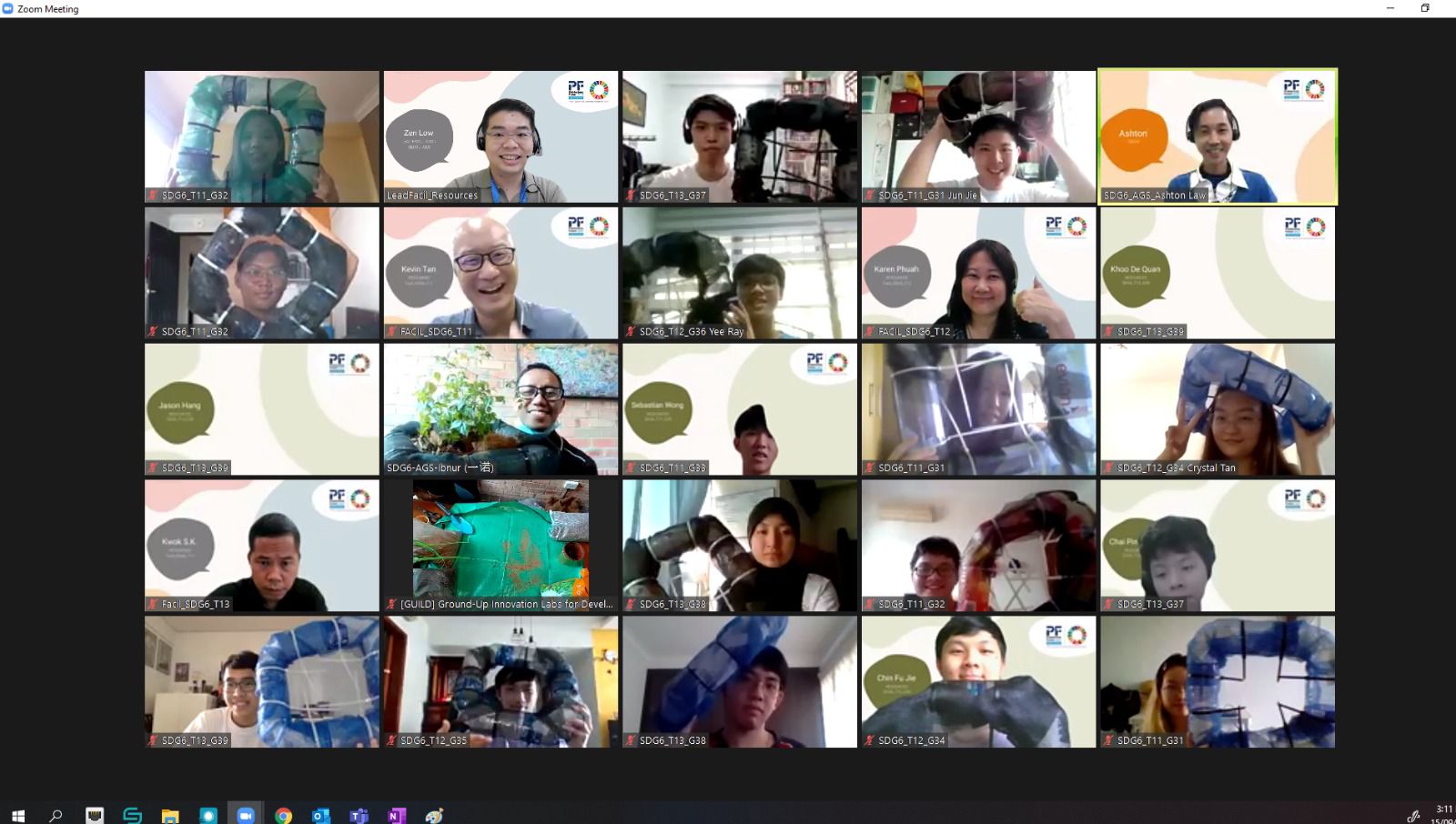
For SDG 6, students upcycled plastic bottles typically discarded in beaches and reservoirs into floating garden systems called ‘Chinampas’, an ancient technology first developed by the Aztec civilization to grow plants almost 700 years ago!
In doing so, they learnt about littering and pollution in Singapore’s water sources and how we can upcycle materials involved in this pollution. The Chinampas created will be deployed to grow plants on the premises of Ground Up Initiative at Lorong Chencharu near Khatib.
For SDG 7, students met with representatives from the Estate Management and Campus Sustainability Offices of Ngee Ann, Singapore and Republic Polytechnic to learn about the electric usage characteristics across various polytechnics. The students then produced a set of recommendations, suggesting what they can do as students to help their campus save energy.
For SDG 12, students role-played as different players in the food industry and discovered why food wastage occurs in Singapore. They also learnt about the concept of food banks, community fridges and composting as ways to reduce food waste; and were asked to look into their fridges to identify food that can be donated to the food bank or community fridges in their neighbourhoods.
For SDG 13, some students created posters to raise awareness on how the public could interact with different animals and wildlife coming into residential neighbourhoods as a result of climate change, while others wrote letters to their Member of Parliament (MP) to advocate for the conservation of green spaces in their neighbourhoods.
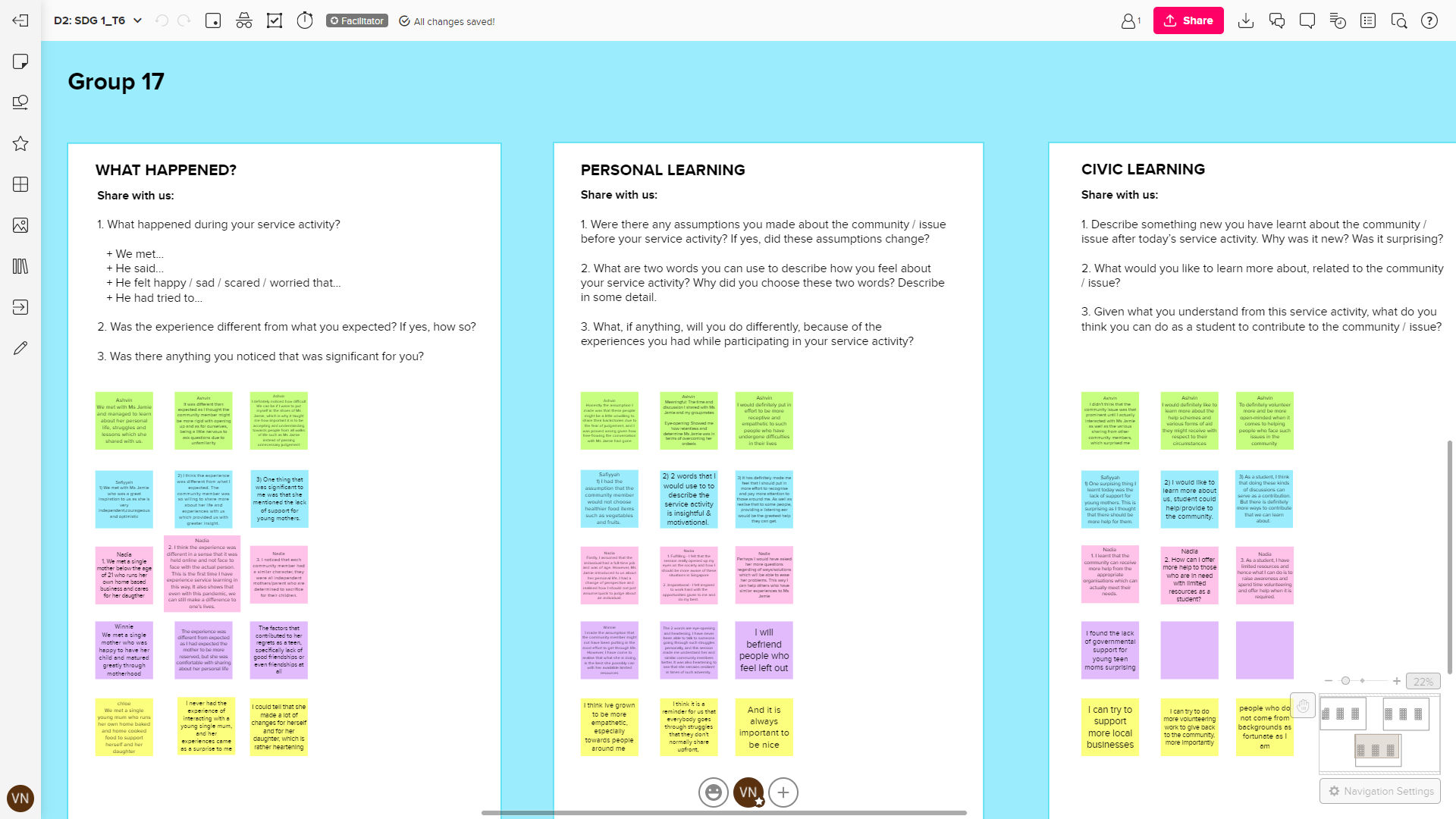
After their various service activities, students had an opportunity to pause and reflect on what they learnt through the lenses of Personal Growth and Civic Learning, inspired by the Service Learning Pedagogy. The students reflected on the following guiding questions:
What happened?
• What happened during your service learning activity?
• Was the experience different from what you expected?
• Was there anything you noticed that was significant for you?
Personal Learning
• Were there assumptions you made about the community before your service activity? If yes, did those assumptions change?
• What are two words you’d use to describe how you feel and why?
• What will you do differently because of your experiences today?
Civic Learning
• What is something new you have learnt about the community / issue after today’s service activity?
• What would you like to learn more about, related to the community / issue?
• What do you think you can do as a student to contribute to the community / issue?
Day 3: Ideation
Albert Einstein once famously said: “If I had an hour to solve a problem, I’d spend 55 minutes thinking about the problem and 5 minutes thinking about solutions.”
Day 3 began with students reflecting on their learnings over the past two days and the issues they are beginning to see, using these questions:
• Share 3 interesting things (quotes, stories and learnings) you remember from last week’s training
• What are 2 things you have a new understanding of?
• What is 1 thing you want to avoid when you solve the problem?
After penning down their individual reflections, students broke out into their project groups of 5, consisting of students from different Polytechnics, to come up with a Problem Statement that they will begin to generate ideas for.
For example, some students in SDG 1: No Poverty came up with the Problem Statement: “How might we reduce the impact of poverty faced by low-income families given that every family has its unique situation which requires custom solutions?”
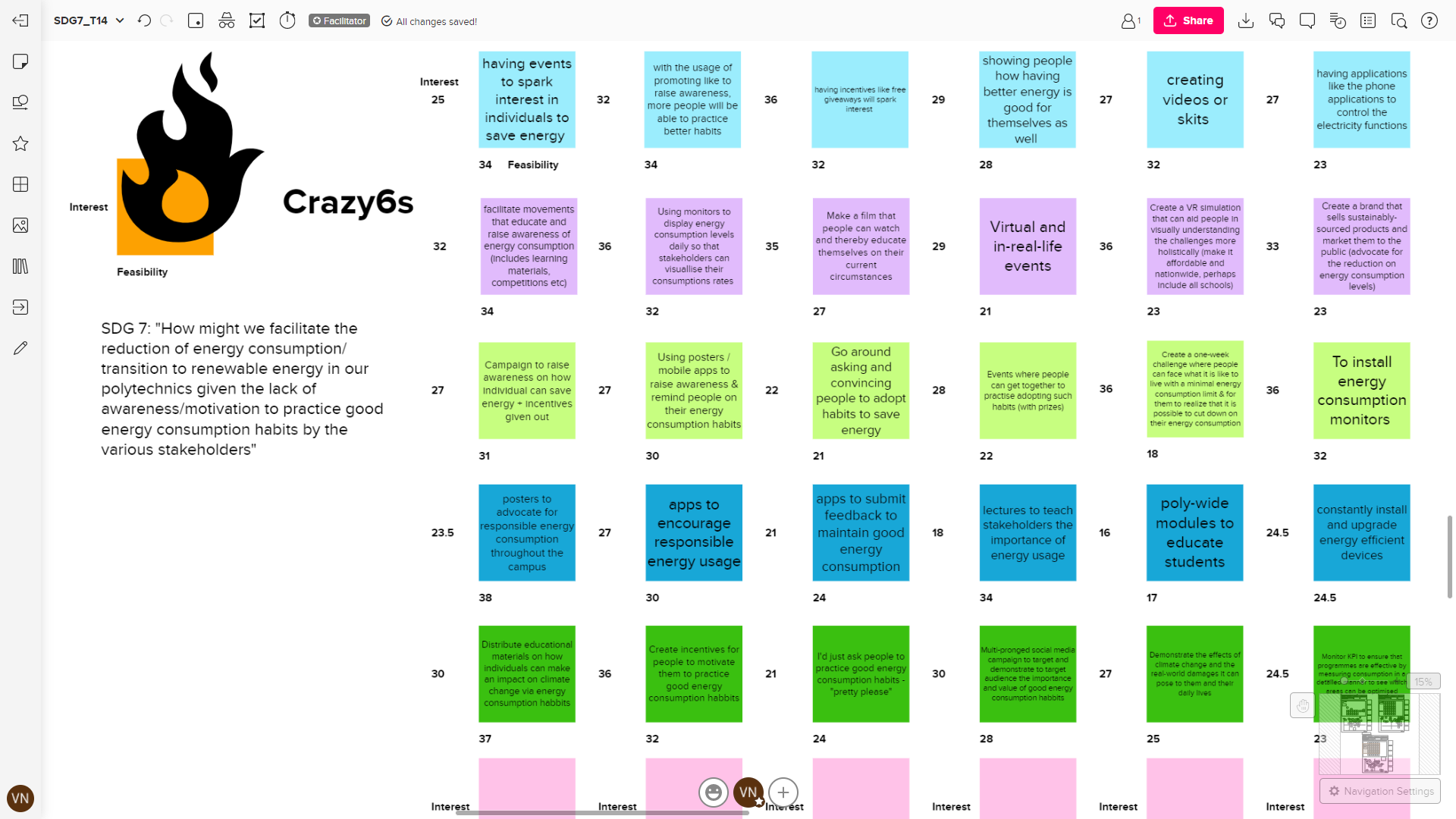
Students then experienced the Crazy 6s approach, an ideation exercise adapted from the Crazy 8s approach, where they had 6 minutes to generate 6 quick ideas for their group’s Problem Statement.
Facilitated by our members Ibnur and Louis, this short and fast paced exercise was designed to harness the creativity of students while setting aside logical and practical considerations.
Shortly after, students shared their 6 ideas with their group members, and they took turns to rate each other’s ideas 1 – 10 on two dimensions: Interest and Feasibility.
Eventually, they used a prioritization matrix to identify the ideas that ranked the highest in Interest and Feasibility, which could be considered for the project that they’d be working on for the rest of the Forum.
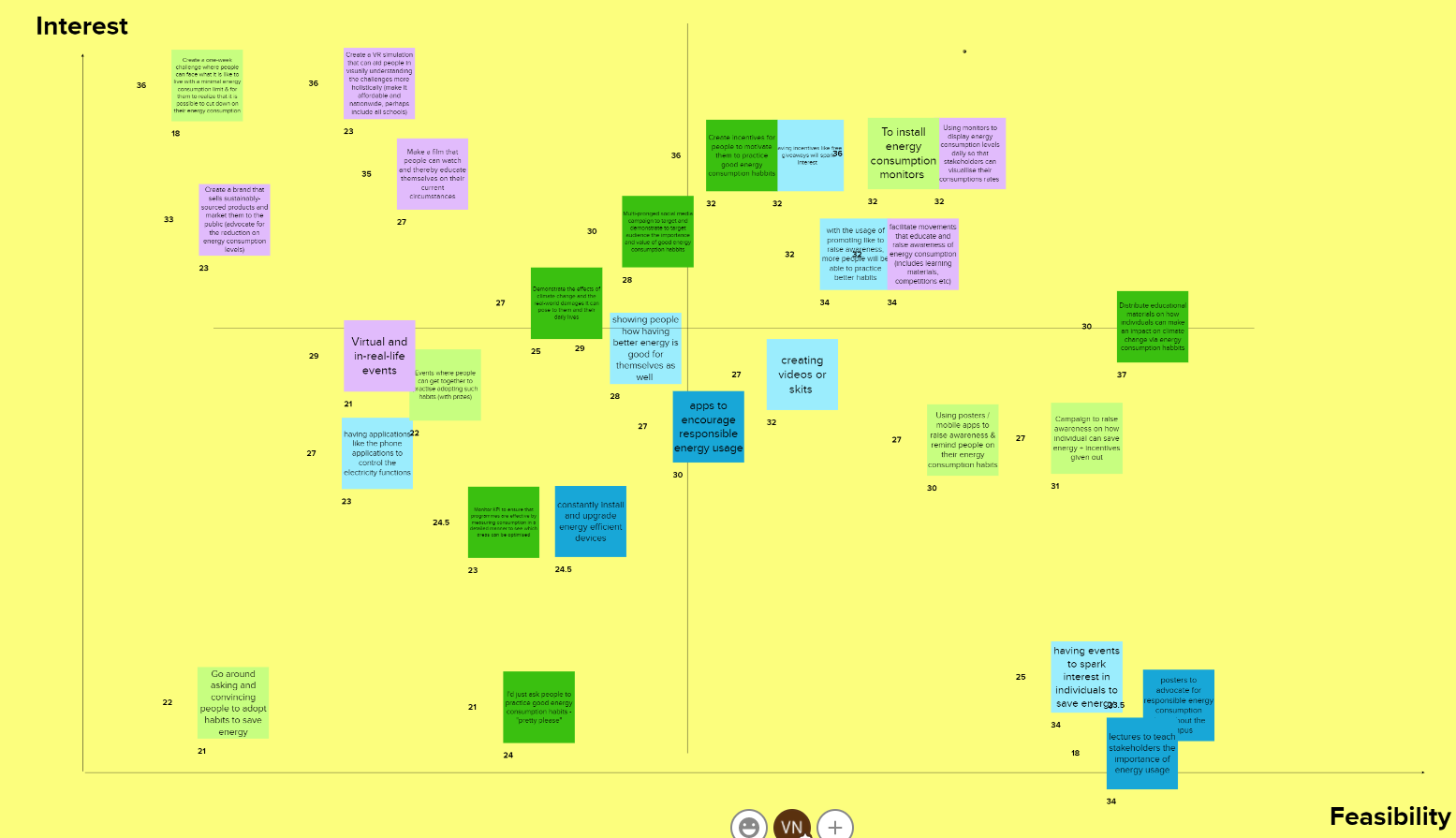
Get out of the building
Any changemaker, entrepreneur or designer knows that in order to build solutions that are truly valuable, one needs to “get out of the building”. An expression first coined by Silicon Valley serial entrepreneur Steve Blank, it refers to the mindset of focusing one’s efforts on talking to people who’d use your service or product.
But with the pandemic imposing strict restrictions on movement and this being a virtual forum, how could we help students to get feedback from the people who’d use their solution? To overcome these limitations, we worked with one of our strategic partners, Beknown, who had developed an emergent crowd-sensing tool called OPPI.
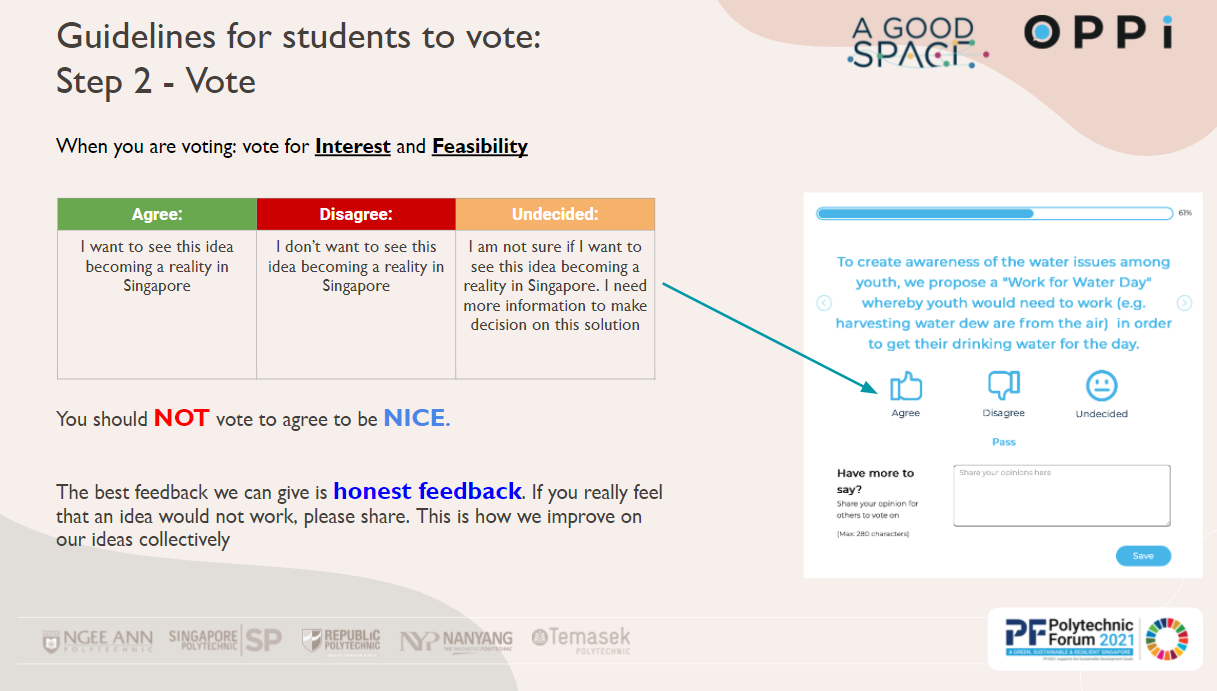
On the afternoon of Day 3, we got students to frame their idea into a statement and using OPPI’s technology, we invited their fellow student participants to vote on these ideas and share their comments.
While this workaround was not perfect, we figured at least students still managed to get some feedback, albeit from their peers, which they could use to further refine and improve their ideas ahead of pitching on Day 4.
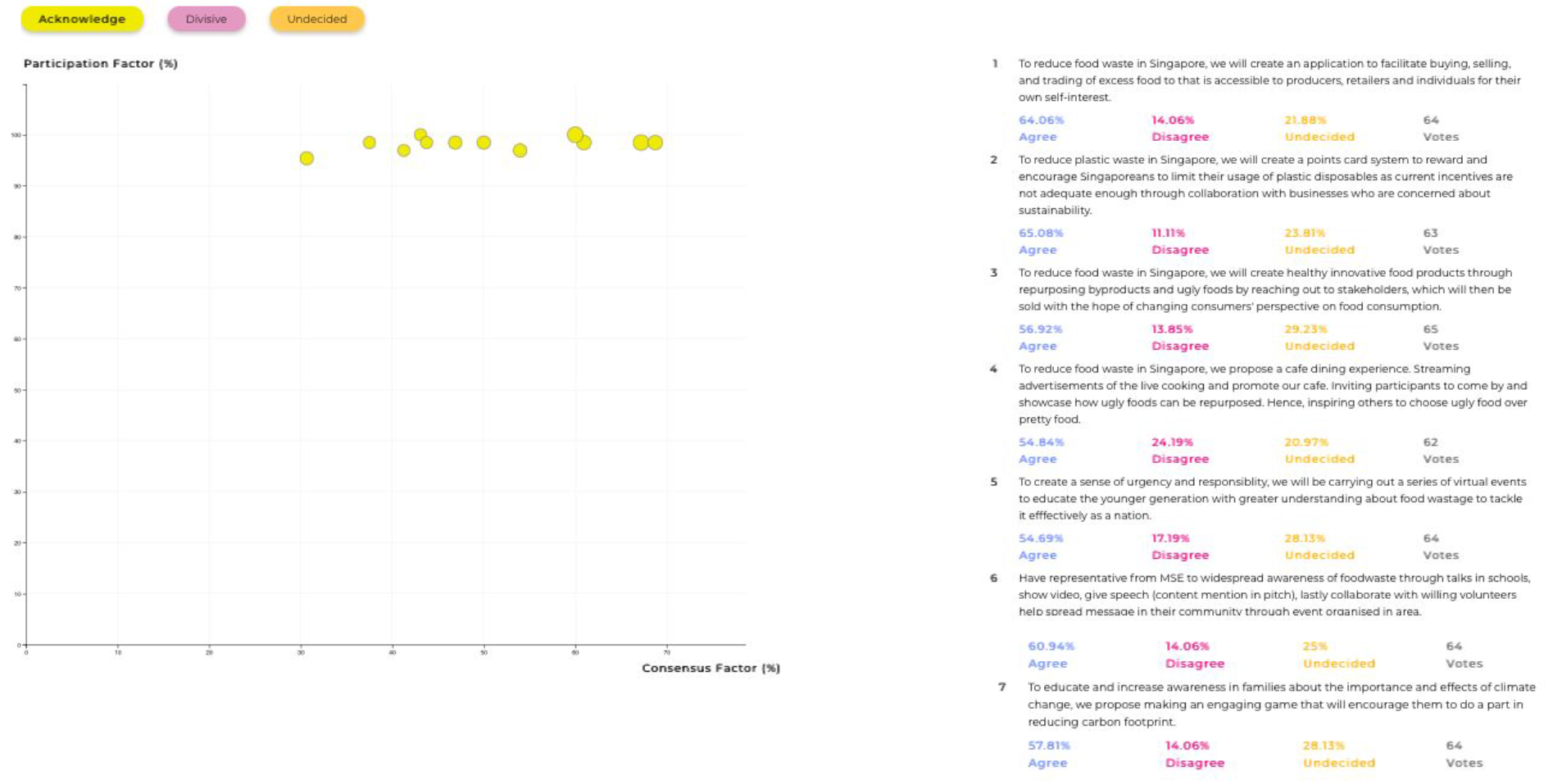
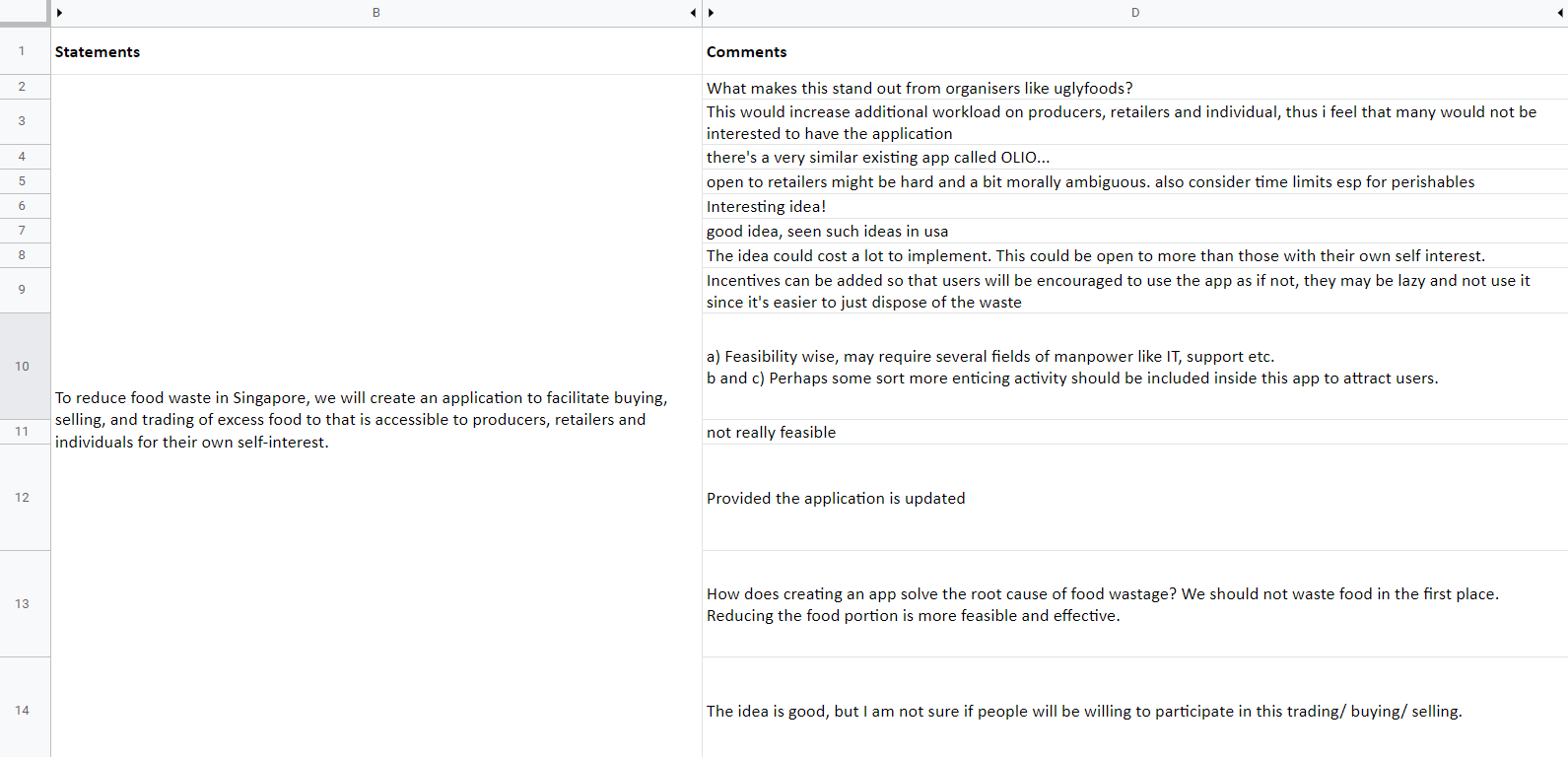
Day 4: Pitching
On Day 4, students engaged in a dialogue with the Education Minister, Min. Chan Chun Sing. Using the results of the OPPI poll from the previous day, Min. Chan was able to quickly see the most popular ideas as voted upon by the students. This served as a backdrop for the conversation and questions to come.
Students asked the Minister questions on a wide ranging amount of topics, from migrant workers to Singapore’s strategy to deal with climate change. We were heartened and inspired by the depth of questions they were asking, which seemed to indicate an emotional connection to the issues or communities they had learnt about in the past few days.
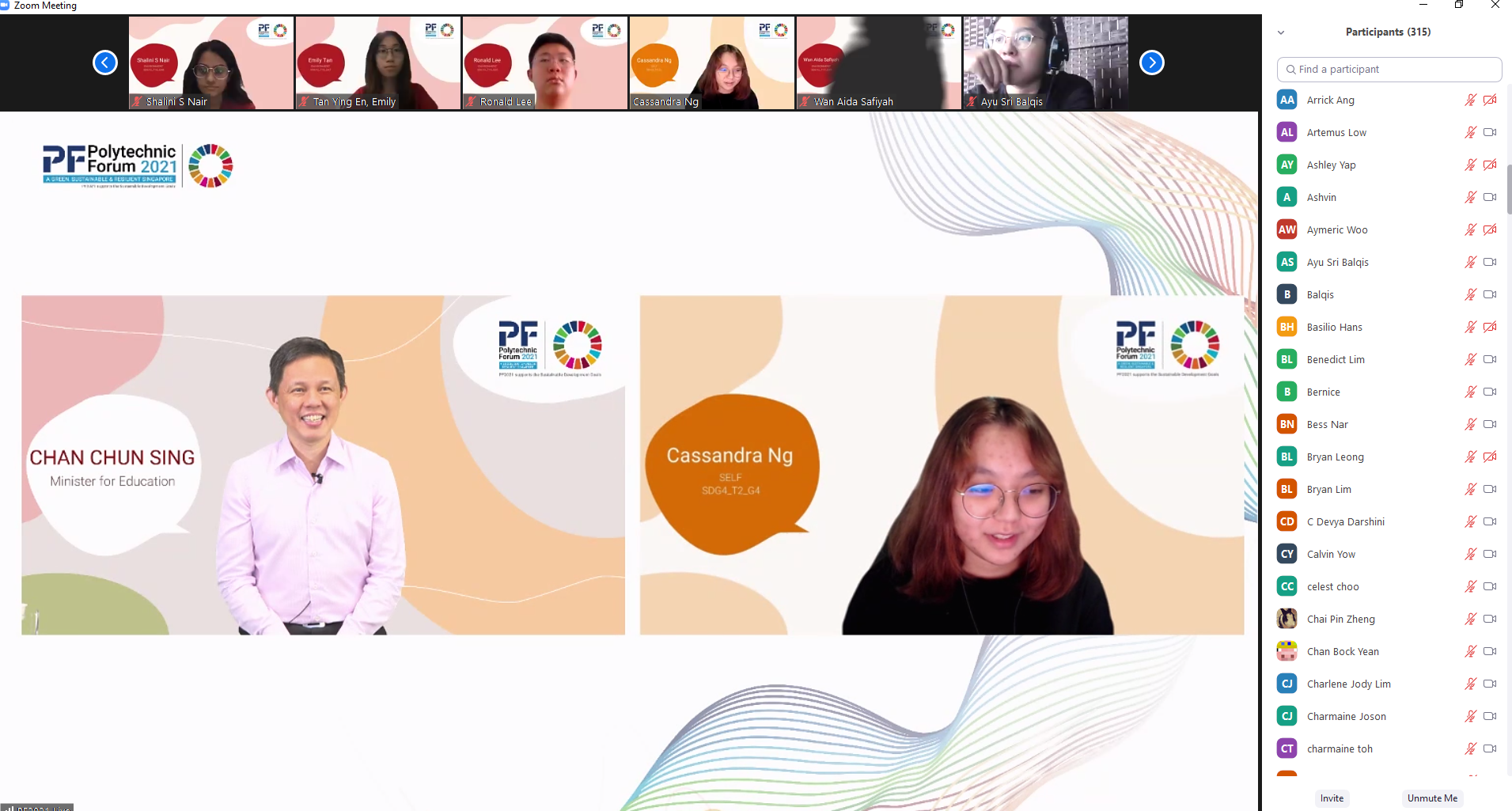
After lunch, students got to pitch their ideas to a panel of judges comprising mostly of community members and changemakers. It was heartening to see scenes where students with ideas for ex-offenders got to hear feedback from an ex-offender himself. We were grateful that despite the various challenges of a virtual forum, the students still had an opportunity to ‘get out of the building’ and get feedback from real people on the ground.
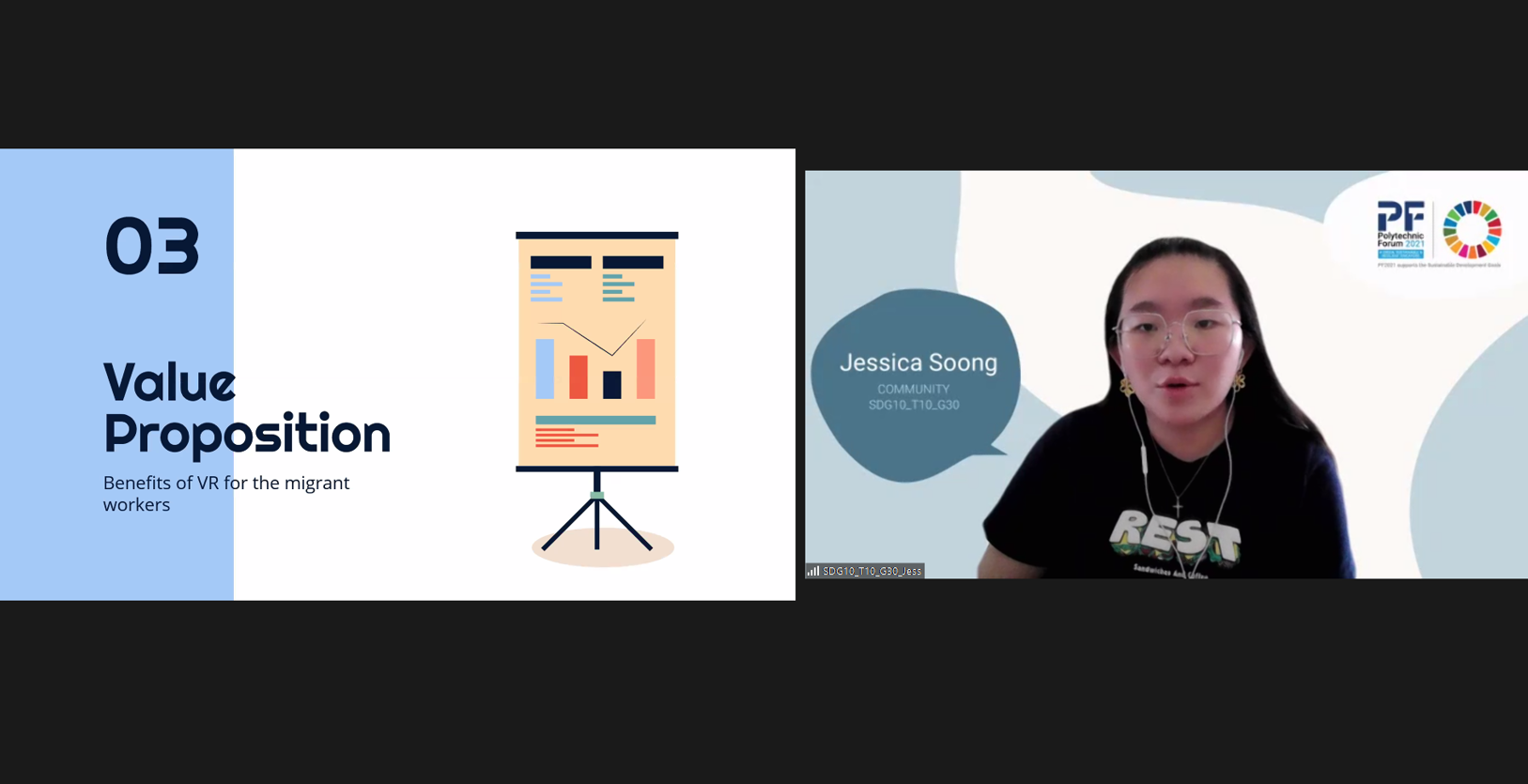
The quality of some of the pitches was really high. Some of the slides produced were beautifully done and the students shared so passionately about their ideas. Some teams coded a website, some created an app mockup while others created draft guidebooks, all in less than 24 hours of preparation!
In our experience working with students of Institutes of Higher Learning (IHLs), even University students will struggle to produce something like this in under 24 hours. It was truly inspiring to watch and we were reminded of that quote:
There is no power for change greater than a community discovering what it cares about
Magaret J. Wheatley
We were delighted to hear instances of different student teams wanting to collaborate with each other after hearing each other’s pitches. In our work, we have learnt that social issues are inter-connected and that everyone has a piece of the puzzle, so it was great to observe the students practicing the muscles of collaboration so early on in their journey.
In total, the 300 students came up with almost 60 ideas for social projects for Singapore! We created a dashboard on Notion.so that showcases all these ideas. If you’d like to see the ideas that they’ve come up with, or perhaps even support some of their ideas, please click on the image above.
Social impact: pre-post survey transformation
To understand if students were positively impacted, we conducted a survey before the forum and on its last day, to measure if the forum positively impacted them across 9 dimensions. In particular, two dimensions stood out.
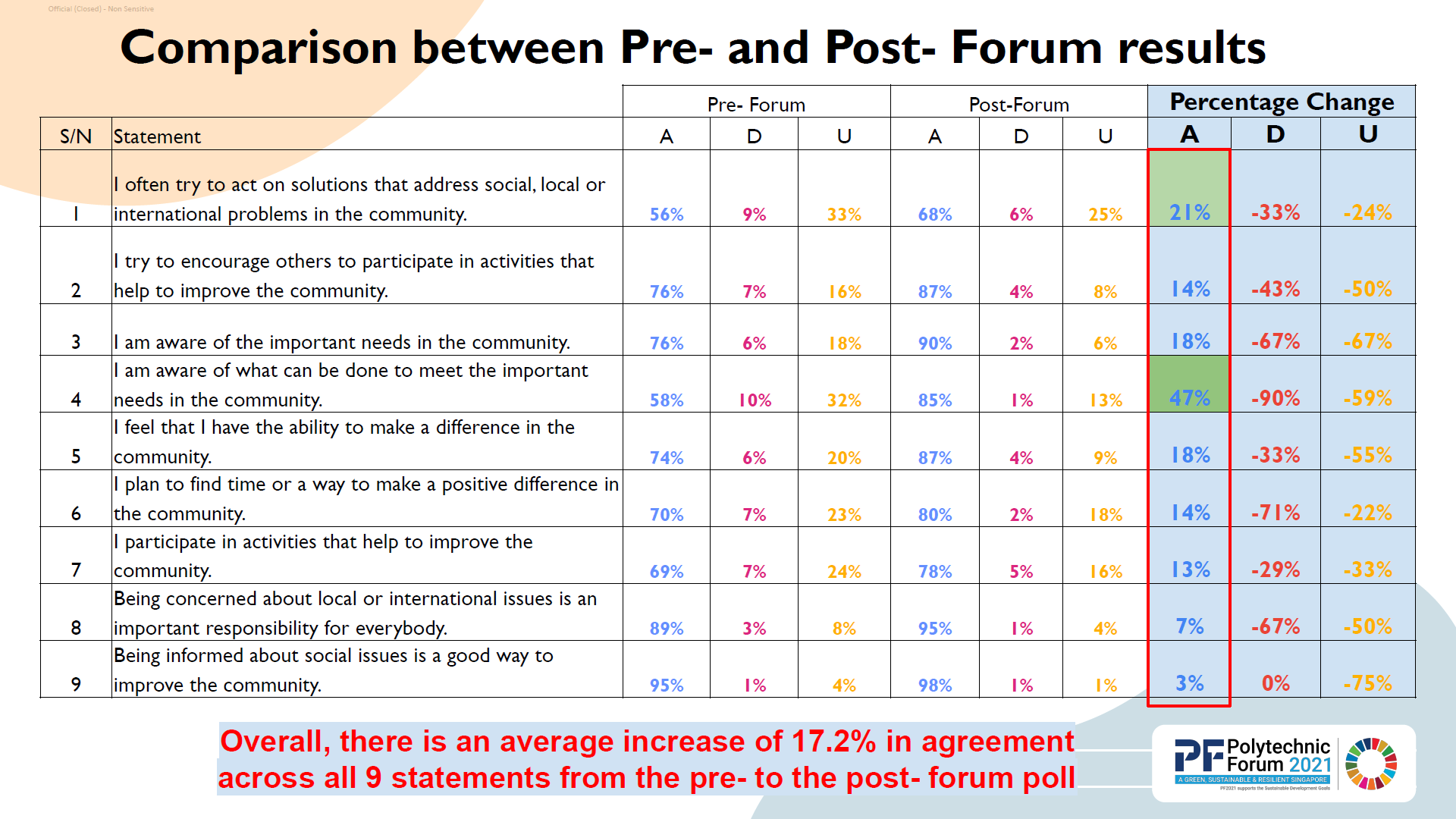
There was a 47% increase in students who said that they are “aware of what can be done to meet the important needs in the community” post-forum compared to pre-forum.
Also, there was a 21% increase in students who said that they “often try to act on solutions that address social, local or international problems in the community” post-forum compared to pre-forum.
These results are heartening as they demonstrate that students are not only learning more about the issues or communities through the Forum, but also feel a greater desire to act on this knowledge.
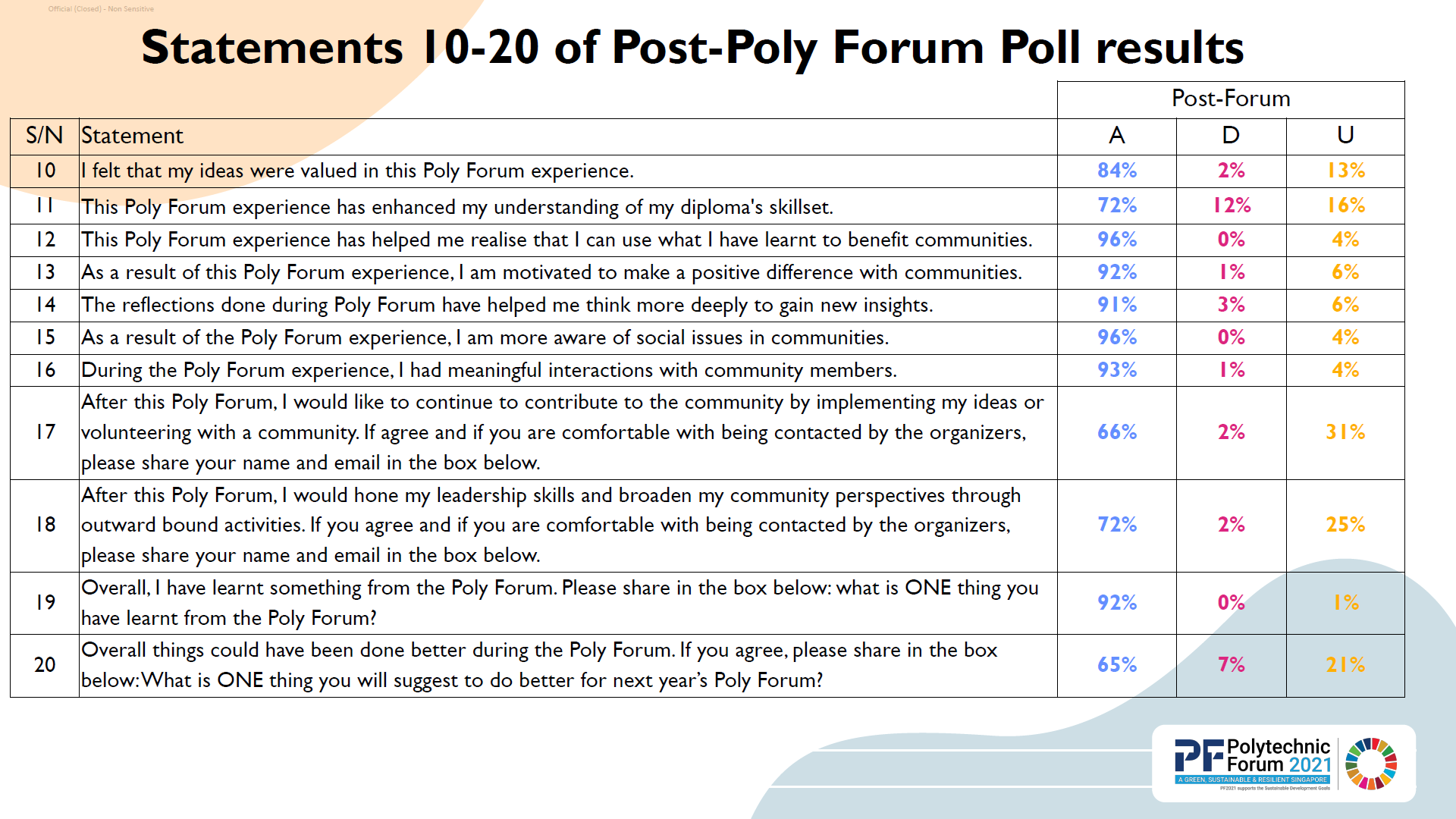
We also measured their overall learning using other questions. In general, the results showed that students achieved positive learning outcomes from the Forum.
Most interestingly, of the 225 students who responded to the survey, 57 students (almost 25%) gave us their email addresses, indicating that they would like to implement their ideas or volunteer with a community (in response to Statement 17).
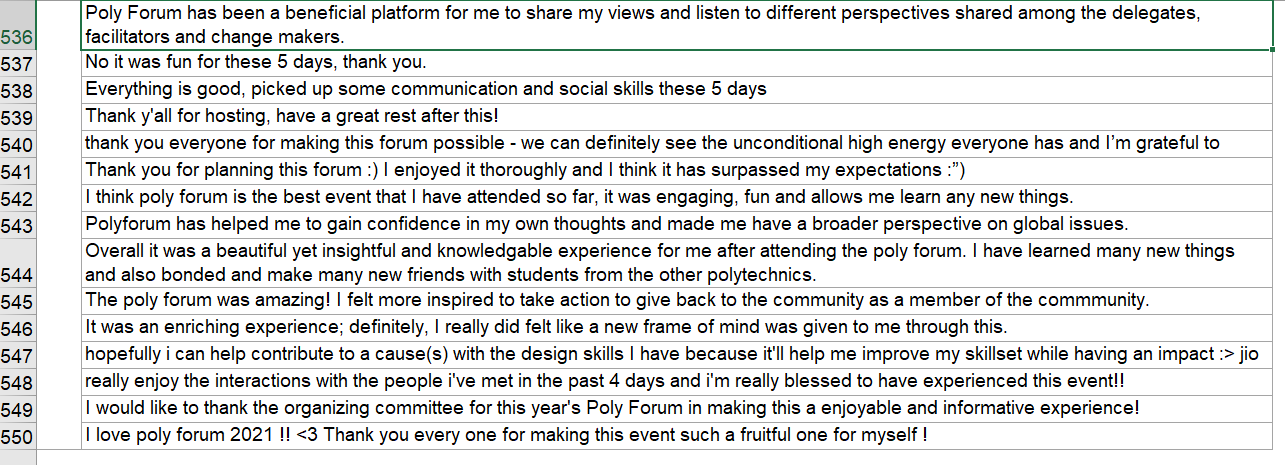
We were also heartened to receive some of these comments in the post-forum survey. Some students even messaged the Ngee Ann organizing team after the forum to express their thanks and share that the 4 days at Polytechnic Forum ‘changed their life’!
Our learnings
Looking back, this was a short and fast paced journey given we only had 2 months to design and implement a virtual forum in the midst of a pandemic. With many different stakeholders to coordinate with across the various SDGs, we are grateful that things turned out well and to see a large network of individual changemakers, social enterprises and ground-up movements figure out a way to collaborate for this Forum.
In our experience, collaborations like these are rare and we treasure this opportunity for us to all come together to inspire the next generation of changemakers. In our reflections, we uncovered an idea for improvement that we hope to pass onto next year’s forum team.
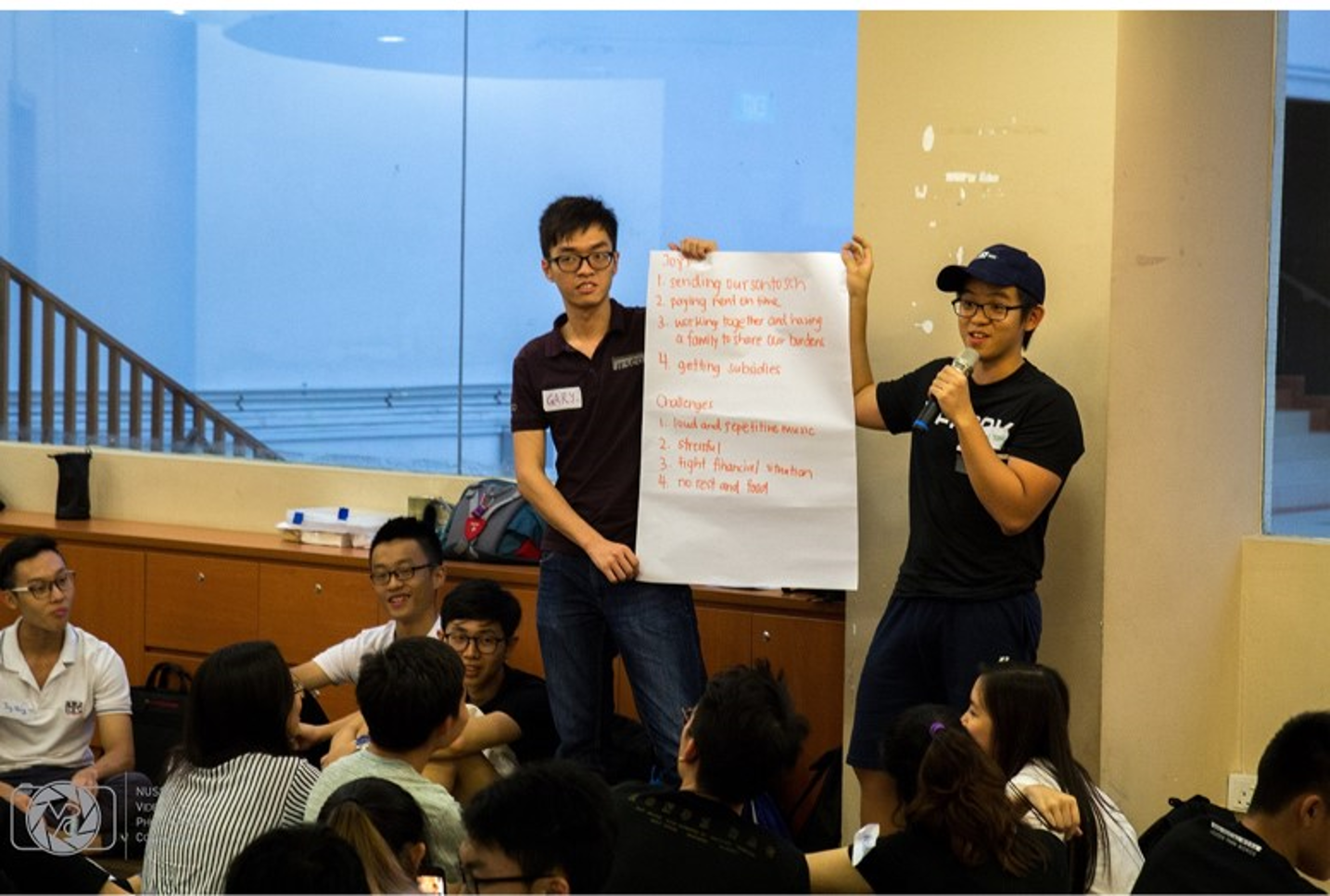
Perhaps pitching was not needed
Instead of having students experience the Design Thinking cycle and ending the forum with pitching their ideas, would it be more meaningful if we focused Day 3 and 4 on cultivating more empathy towards the issues and communities?
What if we had invited students to observe more deeply the learning and emotions that are arising, ending with each student giving a 3 – 5 minute TED talk style sharing in front of the changemakers on Day 4?
Would that have led to a greater willingness to follow through on their ideas, rather than asking them to rush to create a pitch within one day, which can be quite tough for them to come up with a substantial idea?
Going with this design, instead of asking students to vote on ideas, what if we asked them to share their learnings and emotions that they are feeling, and asked their peers to vote on this?
In doing so, we could have identified polarities such as freedom of movement and safety of the public (for migrant worker issues) or trust and accountability (for disbursement of financial assistance) where students may have opposing perspectives, and discussed them in more detail on Day 3 and 4.
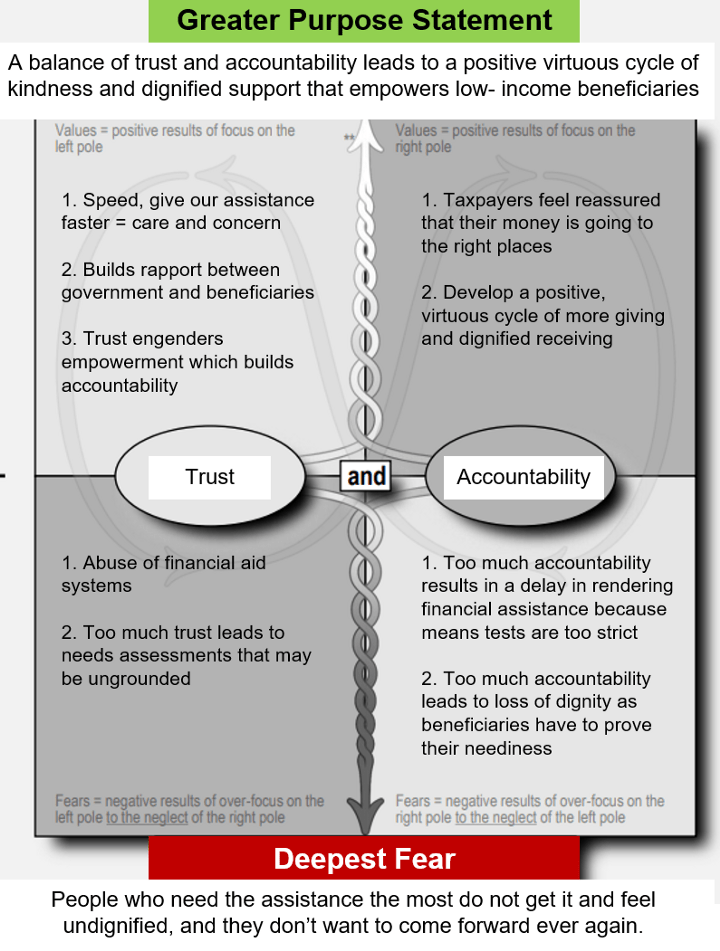
The Minister could then have addressed specific areas where students may have opposing perspectives, which could help the students gain a deeper appreciation on how social issues are complex and there are multiple trade-offs.
Might this have left a deeper imprint on the students in seeing the dilemmas that our Ministers, policymakers and changemakers struggle with? Would more introspection and contemplation have been helpful, instead of ideation, pitching and validation?
Closing
Are you an educator who’s passionate about developing your students to be socially engaged young leaders? If that’s you, we’d love to work with you to design something similar for your school!
Here at A Good Space, we believe in active citizenry. When ordinary citizens can come forward to create, rather than complain, we can support the government and formal institutions when they may be overwhelmed in times of crisis such as the COVID-19 pandemic, thereby creating a more resilient Singapore.
Our schools play a huge role in cultivating a passion for social issues, communities and leadership amongst our youths and we’d love to work with you to nurture the next generation of changemakers for this country we care so much about.
Reach out to us directly here or via email at admin@agoodspace.org!
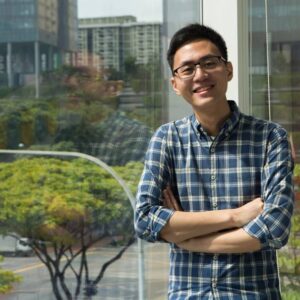
Vincent Ng
Vincent is the General Manager for the A Good Space Co-operative. As a person in recovery from a mental health condition, he first became involved in community issues as a result of his diagnosis. Over the years, he has cultivated a passion for education and contributing to positive social change, in whatever way he can.
